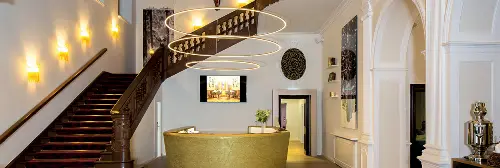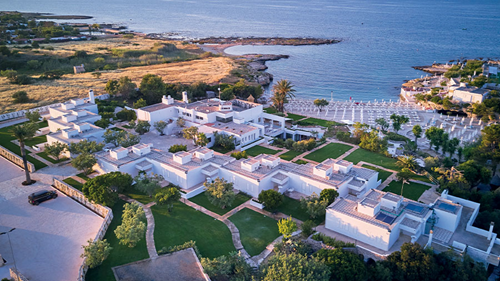

News
/
8/19/2024
Wellness, experience and technology: going beyond the classic idea of a hotel
The rise of new users and new forms of temporary living spaces amongst crises and opportunities
The hospitality industry is experiencing a transformation driven by sustainability, technology, and the attraction for local experiences. Modern travelers seek eco-friendly, tech-savvy, and culturally immersive stays. This trend also embraces inclusive hospitality and flexible work-leisure spaces, redefining traditional hotel layouts and offerings.
The hospitality sector is constantly evolving. Apart from the trends, fashion and formats that seem to be consolidated around well entrenched market patterns, various elements are emerging that break with tradition and deserve to be examined more closely. These elements are forming the foundations for new and significant design opportunities.
Amongst the major drivers behind this change, we certainly cannot overlook the growing interest in sustainability. Guests are becoming more and more aware of the impact their choices have on the environment and are looking for structures that share their values from an ecology perspective. Hotels are responding to this increasing awareness by implementing green initiatives such as the use of alternative energy, waste reduction programmes and cutting-edge recycling practices. This growing “green market” also translates into the use of sustainable materials where, apart from adopting circular economy practices, an entirely new sector of biomaterials is gaining a foothold.
In parallel, new technology is revolutionising guests’ experiences. Automated check-ins and check-outs, for example, are becoming the norm, reducing waiting times and increasing efficiency. Digital keys allow guests to enter their room with a simple swipe of a smartphone. Not to mention virtual concierge services, often based on facial recognition technology or artificial intelligence, that can answer questions, make recommendations and even make bookings, for a previously unprecedented level of personalised service and convenience. Along with all these digital supports there is also physical technology, such as the spread of robotic waiters I saw for myself during a recent visit to China.
From growing interest in sustainability to high-tech services: a new approach to design when defining uses and spaces in hospitality structures
Another emerging trend is the appreciation and promotion of local experiences. Guests, and not just holiday makers, are no longer simply looking for a place to sleep; they want authentic experiences that reflect the local community and its culture. Hotels are meeting this demand by collaborating with local craftsmen, chefs and guides to provide unique experiences such as cultural tours, culinary workshops and local events. Not only does placing more emphasis on what the local area has to offer enhance a guest’s experience, it also supports and promotes the local economy and helps keep cultural traditions alive.
Another interesting aspect is the growing overlap between different types of use. The business/leisure pairing normally used to categorise the reason behind a hotel booking is quickly being replaced by a demand for spaces where the overlap between work and pleasure is hybrid and more fluid for which the internet has coined the terms "bleisure" or "leasness". This trend often translates into creating a certain atmosphere through the use of interior design and creating a physical and virtual extension of a holiday experience, adopting technology and original mixes of possible types of use both inside and outside the guest room. New ways of how we perceive time in relation to priority are gradually being defined where, more and more often, the focal point tends to be wellness and health rather than work and leisure time. Apart from reflecting on how functions are organised, the growing role of psychophysical wellbeing becomes a chance to explore new daily routines and the cathartic experiences available away from the inertia of domestic life and conventional paradigms.

Wellness and fitness facilities play an increasingly important role in choosing a hotel. The photo shows the spa at the Riverton Hotel in Gothenburg (Sweden).
An opportunity to relaunch the territory
Many events over the last few years, such as the various economic, health and geopolitical crises, have had a global impact on the progressive break down of the dichotomy between home and hotel – considered by some in the past as the "anti-home" par excellence – which have inevitably led to a new way of looking at spaces from a time, use and reciprocal flexibility perspective. This trend is also fed by the not so recent phenomenon known as digital nomadism: that world of networks and people that use remote working to move around, occasionally or continuously. The picture that is taking shape is that of a growing propensity, not only spontaneous but also planned, to delocalize work that can be carried out over the internet. Nowadays, many professionals on a global scale no longer accept having to move simply to produce and consume more.
On the contrary, they are searching for experiences and connections that truly mean something, that have value, that can enrich their lives from both a personal and professional perspective. Understanding and interacting with these changes represent an important opportunity for development not only for the network of hoteliers, but also for the territory, not to mention a chance to revitalise those areas that, for too long, have been made to feel subordinate to larger urban areas. For instance, the Italian demographic structure has an incredible variety of offers, as illustrated by the fact that more than 70% of Italian towns and villages, those with less than 5,000 inhabitants, account for only 15% of the entire population.

Many professionals choose the remote working mode to move easily between different locations. Many hotels have reorganized their spaces to adapt to these new requirements.
Inclusive hospitality
We should also not underestimate the interest in inclusive hospitality, a trend in stark contrast to one of the mantras of classic hospitality: exclusivity, intended as the cornerstone of that nucleus of ideas that compete in staying in a hotel being perceived as a unique, customised, one-off experience and, inevitably, not accessible to everyone. While it is clear that certain offers aimed at niche segments will always maintain this approach, the growing specificity in market demand is paving the way to more flexible and higher performing hotel stays that are available to a wider public.
Making hotels accessible to everyone, whatever their physical ability, age or sexual orientation, has become not only a requirement: it also acts as a stimulus towards a rediscovery of the ergonomics of spaces. The value we give to this trend passes through a longer process which includes, first of all, a renewed perception of diversity and how we would like to interact with this diversity.
These changes, some of them yet to come and some already ongoing, open to new design approaches when defining uses and spaces in hospitality structures, especially for those interested in taking on board the requirements from emerging user groups. In fact, if we see the paradigm of a classic hotel as a succession of spaces that gradually conduct from the public arena of the street to the private domain of a guest room, then social, economic and technological changes seem to cry out for an alternative layout.
And this is why the rigid sequence, from the reception to communal areas, corridors and guest rooms, could well be completely overturned, with spaces being reformulated in terms of use and how they interact between shared and public parts to map out a future that goes well beyond the classic idea of a hotel.
The rigid sequence of spaces in a hotel, from the reception to communal areas, corridors and guest rooms, could well be completely overturned
Hotel, upward trend worldwide
Tourism is making and increasingly decisive contribution to the growth of national economies, even in those countries with a well-established industrial tradition. Indeed, it is estimated that the hotel and tourism industry accounts for about 10% of world GDP. For example, Italy (Europe's second-largest economy in terms of manufacturing) is a country with a strong vocation for tourism thanks to its worldwide appeal: in 2023 the share of the holiday business was 13% of GDP corresponding to 225 billion euros.
Last year the industry (after the stop due to the Covid-19 pandemic) increased by more than 8% in the European Union, pushing international holiday spending to 471.5 billion euros. A rekindled desire to travel, despite such external factors as inflation, high interest rates and geopolitical conflicts, is expected to bring the industry’s business back to pre-Covid levels.
A report entitled “Travel & tourism development index 2024” published by the World Economic Forum (WEF), which measures a country's competitiveness on the basis of 102 indicators, has drawn up a ranking that sees the United States ahead of Spain, Japan and France with Italy in ninth place but up three places.
The hospitality sector plays a central role in this overall framework, even in terms of the competitiveness and standard of the country-system. Worldwide there are an estimated 187,000 hotels with 17.5 million rooms: the United States leads the global rankings. The hotel sector is in line with the general trend in the entire holiday industry. After the slowdown caused by the pandemic, the forecasts are positive again. According to assessments carried out by Statistica (a global data and business intelligence platform), the hospitality industry will grow steadily from 2024-2028 to reach 508 billion US dollars in 2028. The numbers point in this direction: for example, 1,842 new hotels were opened in 2022 and 2,707 new hotels are expected to open globally this year. The upward trend explains the increase in investment (especially by hotel chains and large groups) for renovating and rationalising hotels, with amenities (ranging from gyms and spas to sports facilities) being extended to boost overall appeal to cater for changing demand from the tourism industry worldwide.










